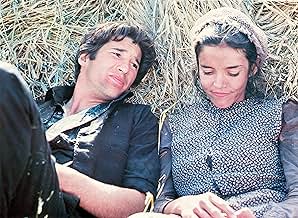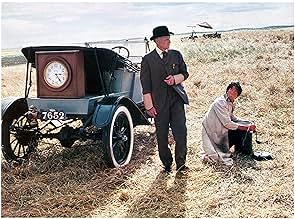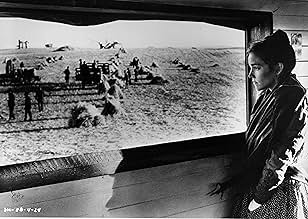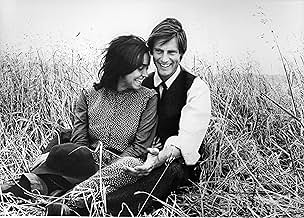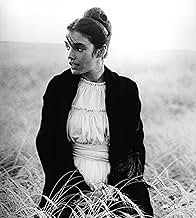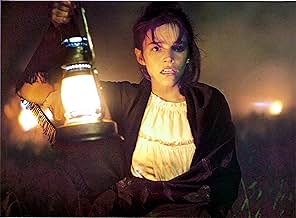Um fazendeiro de temperamento fogoso convence a mulher que ele ama a se casar com seu chefe rico, mas moribundo, para que eles possam reclamar sua fortuna.Um fazendeiro de temperamento fogoso convence a mulher que ele ama a se casar com seu chefe rico, mas moribundo, para que eles possam reclamar sua fortuna.Um fazendeiro de temperamento fogoso convence a mulher que ele ama a se casar com seu chefe rico, mas moribundo, para que eles possam reclamar sua fortuna.
- Ganhou 1 Oscar
- 13 vitórias e 13 indicações no total
Robert J. Wilke
- The Farm Foreman
- (as Robert Wilke)
Timothy Scott
- Harvest Hand
- (as Tim Scott)
Terrence Malick
- Mill Worker
- (não creditado)
Avaliações em destaque
This movie was a full and happy surprise for me. This man, Malick, stood twenty years out of business because he had to be, afterwards, after such a beautiful movie he couldn't and shouldn't return with any other thing shorter than this.
Days Of Heaven is absolutely perfect cinema, the plot is not important, Malick simply wants to fill your senses and he achieves it.
I haven't had the chance to watch it in a theatre, I was four years old at the time, I've watched it on television, and I understood immediately, this man is a hero for building up such a magnificent film in the United States, in Hollywood.
A true director builds a universe of his own, with its own "time flow" and dreams and that is what Malick achieved with this film, magic, sacral art. Some sequences are "almost" (a big almost) Tarkovskyand this is a big commendation.
Days Of Heaven is absolutely perfect cinema, the plot is not important, Malick simply wants to fill your senses and he achieves it.
I haven't had the chance to watch it in a theatre, I was four years old at the time, I've watched it on television, and I understood immediately, this man is a hero for building up such a magnificent film in the United States, in Hollywood.
A true director builds a universe of his own, with its own "time flow" and dreams and that is what Malick achieved with this film, magic, sacral art. Some sequences are "almost" (a big almost) Tarkovskyand this is a big commendation.
10katsat
If any movie could be called filmed poetry, this would be it. From its first opening shot to its last frame, there is such lyricism and emotion and beauty that it almost leaves you speechless. I have not seen this movie in years, but it still affects me and I want to write about it. There is a pervading sadness to the movie, like a memory of something wonderful that could have been, that should have been, that almost was, and is all the more tragic because it was in your hands but slipped through your fingers. This is not a movie for everyone, but if you believe that film can be one of the highest forms of art, this is the film to see.
This is gorgeous looking film very much filmed at dusk and dawn. A film misunderstood upon its time of release and only after Terrence Malick's subsequent films can you now understand what the writer- director was aiming at.
The fact that Malick's next film emerged 20 years later we understand this is a person who wants to tell his story by visuals. Actors talking is just secondary and those scenes end up on the cutting room floor.
Days of Heaven which was shot in 70mm always had a reputation for its Cinematography which won an Oscar.
Now we can marvel at it in our homes on widescreen high definition television. You can really have those close ups of those insects. It is also a surprisingly short film, coming in at just over 90 minutes.
The tale is slight, Gere is a hothead with a girlfriend that is pretending to be his sister and his actual younger sister. They get a job whilst fleeing from Chicago in a farm in Texas where the Farmer played by Sam Shepard takes a shine to the girlfriend and marries her. Gere is aware that the Framer only has a year to live.
Apparently the film took several years to be edited and the narration from the youngest sister had to be added to make the story flow. A similar device was used by Malick in 'The Thin Red Line.'
The film might be seen as slow and maybe hard to fathom because there is relative little dialogue but as mentioned you admire the visuals and at 90 minutes it is not as slow moving as you think.
A brave beautifully crafted film.
The fact that Malick's next film emerged 20 years later we understand this is a person who wants to tell his story by visuals. Actors talking is just secondary and those scenes end up on the cutting room floor.
Days of Heaven which was shot in 70mm always had a reputation for its Cinematography which won an Oscar.
Now we can marvel at it in our homes on widescreen high definition television. You can really have those close ups of those insects. It is also a surprisingly short film, coming in at just over 90 minutes.
The tale is slight, Gere is a hothead with a girlfriend that is pretending to be his sister and his actual younger sister. They get a job whilst fleeing from Chicago in a farm in Texas where the Farmer played by Sam Shepard takes a shine to the girlfriend and marries her. Gere is aware that the Framer only has a year to live.
Apparently the film took several years to be edited and the narration from the youngest sister had to be added to make the story flow. A similar device was used by Malick in 'The Thin Red Line.'
The film might be seen as slow and maybe hard to fathom because there is relative little dialogue but as mentioned you admire the visuals and at 90 minutes it is not as slow moving as you think.
A brave beautifully crafted film.
Welcome to the world of Terrence Mallick where the cinematography is awesome (courtesy of Nestor Almendros) and the dialogue and characters are an afterthought. How else to explain the Brooklyn accents of people supposedly hailing from Chicago? One gets the distinct impression that were this to be pointed out to Mallick he would benignly shrug, such petty concerns of characterization being of secondary or tertiary concern to Mr. Landscape. Give me Ford any day who, like all great film makers, never let his locations, no matter how majestic, dwarf his people. C plus.
Oh, I better come out and say it: I love Terrence Malick. I think he's one of the few filmmakers who has completely and utterly captured filmic form. "The Thin Red Line" was, to me, an astonishing experience; beautiful, horrific and the best movie of the 90s. "Badlands" is the best lovers-on-the-lam movie I've ever seen (it certainly makes "True Romance" look like a gimmicky fraud of a movie). Malick somehow manages to make everything seem painfully beautiful: his landscape, his actors, his dialogue. There's something always elegiac about his movies.
There's a picture of James Dean I saw from his youth -- a baseball team photo -- and the caption said something about how it captured his face, and in it, wisdom and sadness far beyond his years. That's what Malick does in his films and particularly in this film.
He must have been a fan of James Dean (probably one of the reasons he chose to make "Badlands," as a sort of homage), but not in the sense that coolness comes from a perfectly combed coiffure, a red leather jacket (which it wasn't -- it was a windbreaker) and a dark brood. There's a similar story here to that of "Giant," set on a farm with that remarkable house, two men and one girl. Only "Giant" didn't have a philosophizing and very strange little girl. It was also an overblown soap opera and while this film is, I guess, a melodrama, it certainly isn't melodramatic.
If Malick is anyone in the film, he's Sam Shapard; watching his love through a lens. Malick uses Manz as a sort of channel. If this is indeed some fashion of his own story, Malick tells us through her, with he visualized by Shepard, which is a somewhat brilliant approach. Manz is strangely philosophical; at once blunt and abstract. The story is obviously centered around her -- I don't see why this wouldn't be obvious -- but she's pushed into the background, commenting on the characters and informing us like God from above.
As always with Malick, his film is mesmerizing and hypnotic. I was surprised that the film was only a little over an hour-and-a-half. The great Ennio Morricone created a wonderful score for this film that seems to forebode impending doom. Unlike his more famous spaghetti western scores, it's never overly-flamboyant. And the cinematography, listed as belonging to Nestor Almendros, but well-known to be at least substantially contributed to by Haskell Wexler, is so much like an oil painting that it's just about liquid film. I'd be willing to pay a lot of money to see this one on the big screen.
It might seem obvious to state that this film is a transition between "Badlands" and "The Thin Red Line," after all it was the middle film. But this film has moments, especially in the finale, that are surprisingly close to that of "Badlands" and this is the film where Malick fully mastered his approach of lush, visual poetry told at a languid pace that never seems boring, since you're fully within the film;s grasp.
Pauline Kael said in her review that "the film is an empty Christmas tree: you can hang all your dumb metaphors on it." And Charles Taylor, always following Kael's lead (even from beyond the grave), said of Malick's two 1970s films, "Next to the work of Altman, Scorsese, Coppola, De Palma and Mazursky from that period, they're pallid jokes."
What never fails to get me furious is when someone viciously attacks a director, like Malick, for being self-indulgent. Of course it's self-indulgent, he's telling a story that means something to him and trying to share what he feels with us. Malick certainly isn't trying to alienate people, and if you are alienated by his films, well, don't watch them. Malick is a filmmaker like Kubrick, but more fluid and much less abrasive. I mean, if you're going to aggressively attack a filmmaker, aggressively attack someone who is aggressive on his side. Directors like Malick use abstractions to engage their audiences more fully than most. By leaving things -- often feelings -- open to interpretation, the film becomes more intimate.
Certainly one of the most enduring films from the 70s, this is a masterwork.
****
There's a picture of James Dean I saw from his youth -- a baseball team photo -- and the caption said something about how it captured his face, and in it, wisdom and sadness far beyond his years. That's what Malick does in his films and particularly in this film.
He must have been a fan of James Dean (probably one of the reasons he chose to make "Badlands," as a sort of homage), but not in the sense that coolness comes from a perfectly combed coiffure, a red leather jacket (which it wasn't -- it was a windbreaker) and a dark brood. There's a similar story here to that of "Giant," set on a farm with that remarkable house, two men and one girl. Only "Giant" didn't have a philosophizing and very strange little girl. It was also an overblown soap opera and while this film is, I guess, a melodrama, it certainly isn't melodramatic.
If Malick is anyone in the film, he's Sam Shapard; watching his love through a lens. Malick uses Manz as a sort of channel. If this is indeed some fashion of his own story, Malick tells us through her, with he visualized by Shepard, which is a somewhat brilliant approach. Manz is strangely philosophical; at once blunt and abstract. The story is obviously centered around her -- I don't see why this wouldn't be obvious -- but she's pushed into the background, commenting on the characters and informing us like God from above.
As always with Malick, his film is mesmerizing and hypnotic. I was surprised that the film was only a little over an hour-and-a-half. The great Ennio Morricone created a wonderful score for this film that seems to forebode impending doom. Unlike his more famous spaghetti western scores, it's never overly-flamboyant. And the cinematography, listed as belonging to Nestor Almendros, but well-known to be at least substantially contributed to by Haskell Wexler, is so much like an oil painting that it's just about liquid film. I'd be willing to pay a lot of money to see this one on the big screen.
It might seem obvious to state that this film is a transition between "Badlands" and "The Thin Red Line," after all it was the middle film. But this film has moments, especially in the finale, that are surprisingly close to that of "Badlands" and this is the film where Malick fully mastered his approach of lush, visual poetry told at a languid pace that never seems boring, since you're fully within the film;s grasp.
Pauline Kael said in her review that "the film is an empty Christmas tree: you can hang all your dumb metaphors on it." And Charles Taylor, always following Kael's lead (even from beyond the grave), said of Malick's two 1970s films, "Next to the work of Altman, Scorsese, Coppola, De Palma and Mazursky from that period, they're pallid jokes."
What never fails to get me furious is when someone viciously attacks a director, like Malick, for being self-indulgent. Of course it's self-indulgent, he's telling a story that means something to him and trying to share what he feels with us. Malick certainly isn't trying to alienate people, and if you are alienated by his films, well, don't watch them. Malick is a filmmaker like Kubrick, but more fluid and much less abrasive. I mean, if you're going to aggressively attack a filmmaker, aggressively attack someone who is aggressive on his side. Directors like Malick use abstractions to engage their audiences more fully than most. By leaving things -- often feelings -- open to interpretation, the film becomes more intimate.
Certainly one of the most enduring films from the 70s, this is a masterwork.
****
Você sabia?
- CuriosidadesThe shot of locusts ascending to the sky was shot in reverse with the helicopter crew throwing peanut shells down, and actors walking backwards.
- Erros de gravaçãoTowards the end of the movie, Bill fires three shots from a double-barreled shotgun without reloading.
- Trilhas sonorasEnderlin
Written and Performed by Leo Kottke
Used by permission of Overdrive Music A.S.C.A.P. Copyright 1978
Principais escolhas
Faça login para avaliar e ver a lista de recomendações personalizadas
- How long is Days of Heaven?Fornecido pela Alexa
Detalhes
- Data de lançamento
- País de origem
- Idiomas
- Também conhecido como
- Dias de Paraíso
- Locações de filme
- Lethbridge, Alberta, Canadá(Lethbridge Viaduct High Level Railroad Bridge)
- Empresa de produção
- Consulte mais créditos da empresa na IMDbPro
Bilheteria
- Orçamento
- US$ 3.000.000 (estimativa)
- Faturamento bruto nos EUA e Canadá
- US$ 3.446.749
- Faturamento bruto mundial
- US$ 3.492.909
- Tempo de duração1 hora 34 minutos
- Cor
- Proporção
- 1.85 : 1
Contribua para esta página
Sugerir uma alteração ou adicionar conteúdo ausente





